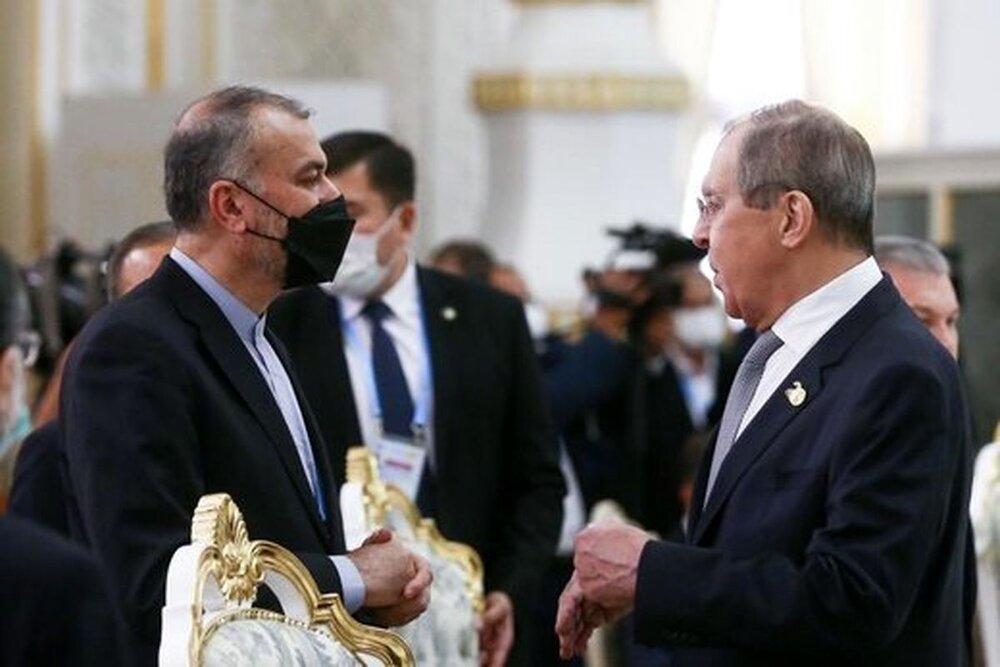Tehran, Moscow intensify consultations amid Western propaganda

TEHRAN –Iran’s top diplomat left Tehran for Moscow amid a flurry of diplomatic efforts to streamline talks in Vienna after Western countries lashed out at Russia for its alleged last-minute “extraneous” demand that brought the Vienna talks to an open-ended pause.
Iranian Foreign Minister Hossein Amir Abdollahian was expected to travel to Moscow on Tuesday. Saeed Khatibzadeh, spokesman for the Iranian Foreign Ministry, said in his Monday press briefing that Amir Abdollahian was planning to visit Russia on Tuesday.
But the Iranian foreign minister left Tehran for Moscow on Monday afternoon, according to Nour News, a move that possibly indicates the gravity of the situation around the stalled talks in Vienna over reviving the 2015 nuclear deal, officially known as the Joint Comprehensive Plan of Action (JCPOA).
The visit was planned after the European parties to the Vienna talks – Germany, France, and Britain (E3) – and the EU coordinator of the talks, Josep Borrell, accused Russia of presenting demands that are not related to the terms of the JCPOA.
After implicitly accusing Russia of presenting “extraneous” conditions on March 8, the E3 pointed the finger of blame squarely at Russia on Saturday, warning of the collapse of the Vienna talks if Russia continued to insist on guarantees it is now demanding to shield its economic cooperation with Iran from Western sanctions over Ukraine.
“Nobody should seek to exploit JCPOA negotiations to obtain assurances that are separate to the JCPOA,” the E3 said in a joint statement. “This risks the collapse of the deal.”
Nearly two weeks after the start of the Russia-Ukraine war, Russia said it needed guarantees that sanctions being imposed on Moscow by the West over the war in Ukraine won’t impede Russia’s cooperation with Iran in all fields.
Russian Foreign Minister Sergey Lavrov said on March 5, “We need guarantees that sanctions [over Ukraine] will not affect in any way the regime of trade, economic and investment ties set out in the JCPOA on Iran’s nuclear program. We asked our American colleagues (because they are running the whole show here) to give us guarantees in writing, at least at the level of the Secretary of State, that the current process launched by the U.S. will not impinge in any way on our free full-scale trade, economic, investment and military-technical cooperation with the Islamic Republic of Iran.”
The Iranian foreign minister mounted diplomatic efforts to address the situation. He spoke over the phone with his Russian counterpart Sergei Lavrov.
“We are against war and imposition of sanctions, and it is clear that cooperation between the Islamic Republic of Iran and any country, including Russia, should not be affected by the atmosphere of sanctions,” Amir Abdollahian told Lavrov.
The Russian foreign minister responded by stressing “the need for cooperation between Iran and Russia in different fields, including various areas of trade and economic relations,” according to the Iranian Foreign Ministry.
The Russian foreign minister also told his Iranian counterpart that “the resuscitation of the JCPOA should ensure that all its participants have equal rights regarding the unhindered development of cooperation in all areas without any discrimination,” according to a Russian Foreign Ministry statement.
The Iranian foreign minister also held a phone conversation with his Qatari counterpart Sheikh Abdul Rahman Al Thani on Saturday. After that conversation, Sheikh Abdul Rahman spoke over the phone with U.S. Secretary of State Antony Blinken and then headed to Moscow on Sunday. In Moscow, he met with Lavrov and discussed the Vienna talks and the war in Ukraine. But it is unclear yet if he made any headway in terms of ending the pause in the Vienna talks.
While Sheikh Abdul Rahman was still in Moscow, Amir Abdollahian held another phone call this time with Oman’s Foreign Minister Sayyid Badr Albusaidi.
Amir Abdollahian’s diplomatic efforts could reach their crescendo in Moscow when he will discuss the Vienna talks face to face with Lavrov. Nour News, which is close to Iran’s Supreme National Security Council, described the visit as “meaningful,” underlining that it will provide an opportunity for “serious, frank, and forward-looking talks between two countries which indicated that they can have very close, defining, and successful cooperation on very complicated subjects.”
“The trip could be important in many ways in the midst of the complex context of the Vienna talks, as well as the escalation of the Ukraine crisis, which has led to an unprecedented confrontation between the West and Russia,” Nour News said.
